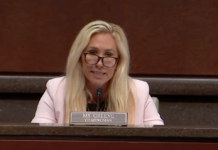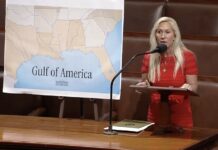
(GA Recorder) — Two bills authored by Woodstock Republican state Rep. Wes Cantrell aimed at giving families a choice of where to send their children to school moved forward in House committees Tuesday, including one that could make taxpayer-funded school vouchers available to all Georgia students.
Both House Bill 999, which passed a House Education subcommittee and House Bill 60, which passed the full House Education Committee, aim to expand the state’s school choice options to include private operations, but the former bill could potentially affect many more students.
“We must focus on funding students and not systems because one size does not fit all, especially as it comes to education,” Cantrell said. “We already fund students directly with Pell grants and the GI Bill for higher education. The same goes for pre-K programs like Head Start. All I’m asking is that we take that same logic for pre-K and for higher education. Let’s apply it to K-12. education and fund students, not systems.”

Some parents, education experts and Democrats on the committee disagreed. They were skeptical of what they characterized as a plan to take state funds and funnel them to institutions that do not have government oversight or as stringent requirements for teachers.
The committee passed HB 60 last year intending to give scholarships to a limited number of Georgia students to spend on private school tuition or other educational needs including tutoring or therapy for children with special needs. The number of participating students would be capped at a quarter of one percent of the total enrolled population of the state the first year, and that number would increase by another quarter percent each year the state fully funds its education formula to a maximum of 2.5% of all enrolled students after ten years.
Using numbers from October 2021 and not accounting for future growth, that would mean the program would include about 4,350 students the first year and max out at about 43,500.
The scholarship amount would be based on the state portion of the per-student cost of providing a public education, now about $6,400, Cantrell said. To qualify, students would need to be enrolled in a Georgia public school and come from a family whose income is below 200% of the federal poverty line — $55,500 for a family of four — or meet one of a number of other criteria, including children adopted from foster care, children with an active duty military parent, children with an individualized education plan or Section 504 plan because of one of a list of conditions or having spent the last school year at a school that did not offer face-to-face instruction.
House Bill 999 would be available to all public school students and include an annual scholarship of $6,000, 95% of the per-student cost. It would be up to the House Appropriations Committee to determine how many students could participate, Cantrell said.
The bills are mutually exclusive, so should House Bill 999 pass the full committee, members will need to decide which one to send to the House for a floor vote.
Public schools often do a great job, said Cantrell, a former teacher, but some students may simply not be a good fit for the school they are assigned to based on where they live.
“For every student that would take a program like this, it would actually save the school that they left an average of $3,800, so you’re not defunding public schools, you’re actually adding, and the funding per student actually goes up,” he said.
“It’s not either-or,” he added. “We have the ability to do both. I don’t think we should say, ‘Well, we’re not going to give parents a choice because we need more counselors in the school, and if we give the choice, by this, the numbers don’t lie. It saves the public schools money, saves the state money, 5% for every student.”
Gwinnett County mom Holly Terei said her 11-year-old daughter has an attention deficit disorder diagnosis and has been falling behind because her district uses virtual learning.
“My daughter’s mental health continues to deteriorate, and her learning loss continues to build,” she said. “The lack of access to school choice in the state of Georgia has now created a very deep and wide learning gap just between my daughter and her peers. Now I ask you to imagine that at a much greater scale because this is what we are facing when students cannot access quality education.”
Terei previously told Fox News she pulled her children out of public schools because of the district’s mask mandate and is party to a lawsuit over the mandate. She told the committee her other daughter, a third-grader, can barely remember what in-person school is like, and it pains her to think about where she would be academically if she were at a different school.
“My family is not in the position to move to a different county,” she said. “My family cannot afford private tuition. My family cannot afford to become a single income household so one parent can adequately homeschool, and so we are stuck.”
But alternatives to public schools available in populated counties like Gwinnett aren’t as readily available in rural parts of Georgia.
“Consider that the student who leaves Bacon County’s great schools wouldn’t have a private school option in the county,” said Stephen Owens, senior K-12 education policy analyst at the Georgia Budget and Policy Institute. “She would also be leaving a system that protects from discrimination based on income, sexual orientation or ability. If she is not being served well, the solution cannot be to fund a school that might expel her for being gay or one where the teacher doesn’t have a bachelor’s degree.”
“Georgia’s public schools are struggling to hire licensed teachers, substitutes and bus drivers,” he added. “Our state has been unable to pay for even one counselor for every 450 students in the school, a paltry amount considering the best practices of one for every 250. We remain one of only six states in the nation that does not provide additional funding to educate students living in poverty. Any dollar that we spend on this voucher should instead be used to protect the underfunded public schools the state has a constitutional responsibility to support.”
Others questioned whether the funds would be of much use to low-income or rural families, suggesting they may simply amount to coupons for families that were already sending their children to private schools.
Cindy Battles, director of policy and engagement for the Georgia Coalition for the People’s Agenda, said the program would not have benefited her son, who struggled to get by in public school.
“For years, he struggled with depression. My 12-year-old child was threatening to commit suicide,” she said. “And yes, I looked, I tried this idea of private education, even with your $6,000 scholarship, it wouldn’t have been enough because I was raising two kids. Even if I could have afforded it, the school that would have taken him was clear across the county. This may help a few kids, but it hurts many kids, like mine, who grew up to be a Marine, by the way, and I’m very proud of him.”

Cantrell said the program will likely not be a good fit for every student, but his hope is that it will be a major benefit for the minority who need it.
“All I’m trying to do is, regardless of what that person’s story is, (to ensure) that they have an option, and it might not work for them in their situation,” he said. “In fact, it’s very likely not going to work for that many people, we’re talking about a small percentage of people that it will help, but that’s a significant number of people, no matter if it’s 500 or 1,000.”







